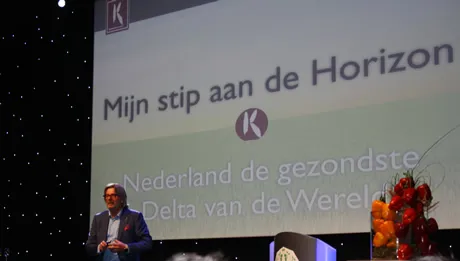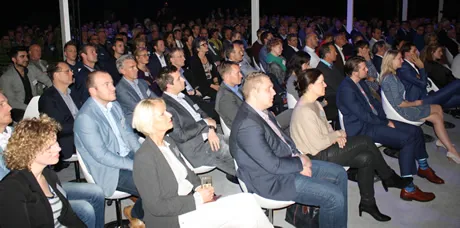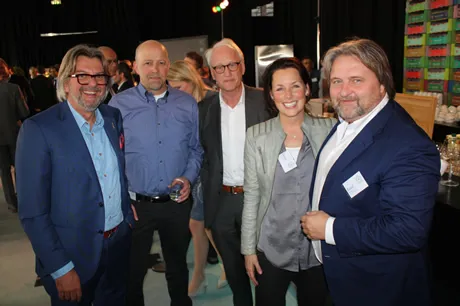Koppert Cress celebrated being 5,000 days old yesterday. Manager Rob Baan invited hundreds of contacts for the occasion. In a setting only one gardener in the Netherlands could create, he revealed his longterm goal for the coming 5,000 days: Making the Netherlands into the healthiest delta in the world. He wants to achieve this with Dutch Cuisine from the catering industry under the guise of 80% vegetable, 20% animal and 100% flavour. With caterer Bob Hutten he set up the healthy restaurant Bob en Rob, for which he is not going to pay VAT. “It is truly absurd that you have to pay taxes for healthy fruits and vegetables in the Netherlands.”

Rob's long term goals...
Six heroes were given speaking time to enforce this mission. The first was Professor Wim de Ridder. This professor of future studies was in Ron Baan’s good book because of the advice he gave Baan when he first started his company: that the price of electric power would fall considerably. He now advised to create a platform in food metropolis Rotterdam in order to realise the healthy delta. “You cannot learn much from the past, start working together now.”
The second speaker was paediatrician Koen Joosten of the Sophia Kinderziekenhuis, the children’s hospital in Rotterdam. He warned that the time to act is now regarding the state of health in the Netherlands. He wants to stand on the barricades with Rob because many health problems such as diabetes and obesity can be avoided by having a healthy diet with plenty of variation. “As a paediatrician I do not just want to heal the sick, I also want to prevent sickness. The taste for broccoli starts in the womb,” he told the audience. “Never give children sugary baby food with vegetables, but repeat and use different kinds of vegetables. They will take that with them for the rest of their lives. Furthermore, sugary drinks have to be banned for children between 0 and 4 years old, nurseries have to serve vegetables every day and alliances have to be formed between growers and supermarkets to make children eat healthier.”

Rapt attention
Manager Gert Mulder of GroentenFruit Huis also called for vegetables becoming top of mind again. He pointed out the need for intricate distribution to get the vegetables to the consumers again and gave examples of how a good presentation can easily multiply vegetable consumption even in well-known fast food chains. “And the bonus of increased fruit and vegetable consumption? Eight billion in turnover and 120,000 new jobs.”
Hein Deprez of Greenyard Foods called greenhouse farming the most sustainable method of food production. “You are a leader of that in the Netherlands. Take, for example, strawberry cultivation, fifteen years ago everyone thought it would disappear from the Benelux and move to southern Spain or Morocco. Because of hydroponic cultivation it is now possible to create a cost effective cultivation with the highest labour costs.” According to Hein there is no overproduction, but underconsumption. “You grow far too few tomatoes.” The top man of Univeg praised the diversity of the fruit and vegetable assortment with its many vitamins, minerals and fibres, but at the same time called it the bottleneck. “The consumer demands a product that is exactly the same, only then will it be trusted and that standardisation for fruits and vegetables is not easy. Luckily we are becoming more and more successful in that aspect, for example, by ripening avocados, mangos and bananas.”
The latter fits Shawn Harris of Nature’s Pride like a glove. She said she came to the Netherlands for love in 1989, with only two suitcases, a bicycle and 100 dollar. The love did not last, but the company did. Shawn explained always having believed in better quality products and better relationships with growers. That resulted in, among other things, one of the first mango ripening cells and an ethical trade agreement with suppliers. By now she has been in business for sixteen years and her assortment has grown from 40 products in 2004 to 500 products nowadays.

Rob Baan with his friends: Huib Herbert of Vijverberg Advies, Prof. Wim de Ridder, Sanne and Ruud Koornstra
Shawn indicated that the focus of Nature’s Pride is becoming more and more about sourcing. “Three years ago China imported zero avocados, now they import three crates a week. We are preparing for a global shortage of avocados in the coming years.” The entrepreneur impressed upon those present to only supply quality and flavour, to keep customers and suppliers happy, but to not be afraid to say no occasionally. She also opened the door to growers from the Westland. “We involve 500 products from 70 countries, but some of those could easily be grown in the Westland. Do not be afraid to place new products in the greenhouses and go for it.”
Trendwatcher Adjiedj Bakas was already present as a speaker with the opening of Koppert Cress ten years ago, and has now been flown over by helicopter again. He called for not forgetting the fun factor of food. “People have negative associations with the word vegetable, but they are positive when it comes to salads. Why would you not sell them like that?” In an inimitable manner and with much visual material he showed what food production in the future could look like. “Go off the beaten track and create something.”
It fit Rob Baan like a glove…
Click here for the photo report






